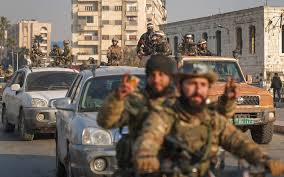I have long tried to understand what drives a wide segment of intellectuals to stand by Syria’s ruling authority—as if it holds the key to salvation. Some do so out of fear, others out of delusion, and still others, perhaps, out of opportunism. But let us be clear: had this regime accomplished even a single genuine achievement, I might have been among its defenders. The reality, however, tells a very different story—a bleak tale of collapse, sectarianism, and the systematic dismantling of the state.
What follows is not opinion but observation, a concise record of where we are today:
First, the regime has destroyed what remained of the Syrian state’s institutions. The bureaucratic apparatus—once the backbone of governance and public life—has been hollowed out, despite being a structure built over decades, even centuries. The civil service no longer serves the public; it serves the regime.
Second, power is now monopolized entirely. From high-ranking sovereign positions to the most basic administrative jobs, access is granted only to those loyal to the authority or affiliated with it. Merit has no place in a system governed by proximity and obedience.
Third, the military, once a national institution with at least nominal balance, has been transformed into a sectarian army from top to bottom. Its current ideological orientation is not republican or even nationalist—it is steeped in jihadist Salafism, a radical and dangerous doctrine that threatens to erupt in full force in the years to come.
Fourth, the security services mirror this sectarian shift. Under both Hafez and Bashar al-Assad, Sunnis retained a significant presence in these institutions. Today, they are almost entirely excluded, as the apparatus becomes a tool of narrow identity-based control.
Fifth, the legal framework has not escaped this transformation. A so-called constitutional declaration has been tailored to fit the regime’s needs—void of legitimacy, unrepresentative of the people, and unreflective of Syria’s diversity. A judiciary has been built around it, not to uphold justice, but to rubber-stamp repression.
Sixth, the People’s Assembly, rather than being a forum for genuine representation, now functions as a caricature of parliamentary life—reminiscent of the “republics of fear”—with one voice and no real opposition.
Seventh, behind the scenes, a shadow government and parallel economic committees manage vast wealth and assets. Their mission: to seize the fortunes of major Assad-era elites—but without any transparency, oversight, or legal accountability. These confiscated assets bypass the state and its central bank, raising the disturbing question: are they being used to fund clandestine activities?
Eighth, Syria’s economy has collapsed. Living conditions deteriorate by the day. There is no rescue plan, no productive infrastructure, no serious effort to rebuild. The regime governs like a tribal chiefdom, not a modern state.
Ninth, internationally, the situation is equally dire. Instead of moving toward normalization or relief, Syria faces deepening isolation and expanding sanctions—an indictment of the regime’s conduct, not the people’s suffering.
Tenth, domestically, chaos reigns. Daily murders—whether criminal or sectarian—go largely unpunished. Kidnappings are widespread. Organized crime operates with impunity across many provinces.
Eleventh, women are abducted for sectarian reasons in growing numbers—90 Alawite women, 82 Druze, and at least three Sunnis, according to documented cases. These are not random crimes; they are calculated efforts to unravel the country’s social fabric.
Twelfth, investment is frozen. Despite grand announcements and hollow agreements, no tangible projects have materialized. Investors, foreign or domestic, will not put their faith in a lawless state run by militias and secret committees.
Thirteenth, militias now rule. Armed groups loyal to the regime—but not to the state—are the real power on the ground. There is no central command, no unified military doctrine, no rule of law. Syria, in effect, is ruled by warlords.
Fourteenth, perhaps most disturbing of all, three sectarian massacres have taken place in recent months. They were carried out in cold blood. No investigations. No accountability. Official narratives swept them under the rug.
Fifteenth, the regime is not preserving Syria—it is fracturing it. Syrians are being forcibly pushed into warring sectarian enclaves, dragging the country back to a pre-modern era.
In sum, the regime is not preserving Syria—it is dismantling it. It is fracturing the country into warring sectarian enclaves, dragging us back to a pre-modern era of tribalism, fear, and authoritarian control.
To defend this regime—or even to remain silent in the face of what it has become—is a moral and political crime. It cannot be justified on any grounds. This is not a regime of stability or sovereignty. It is a regime of fear, destruction, and regression. It feeds on the very divisions that Syrians have long struggled to overcome. It is dragging us back to the Middle Ages, cloaked in the language of modern governance.
And yet some still speak of “salvation.”
What, then, are they seeing?


